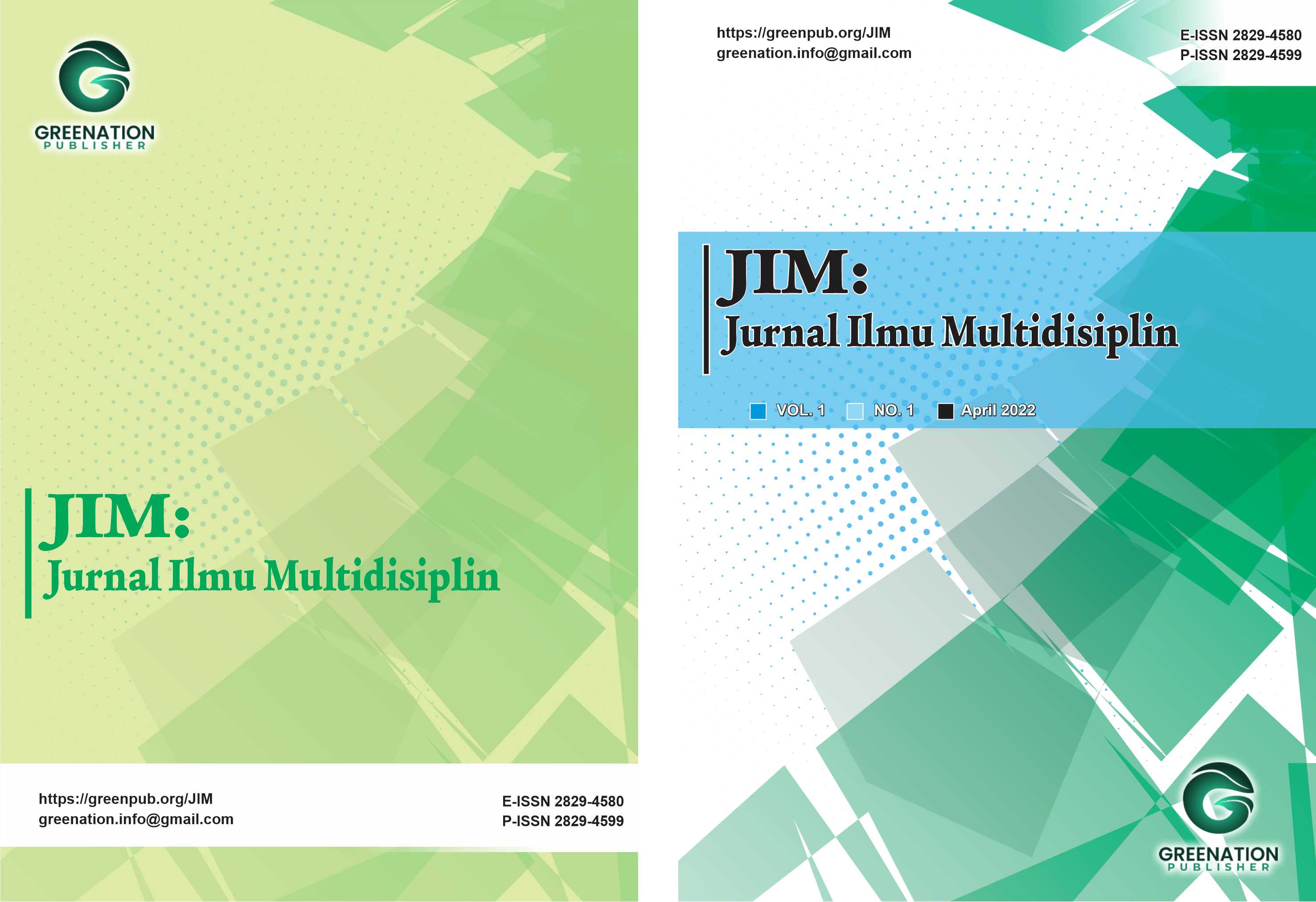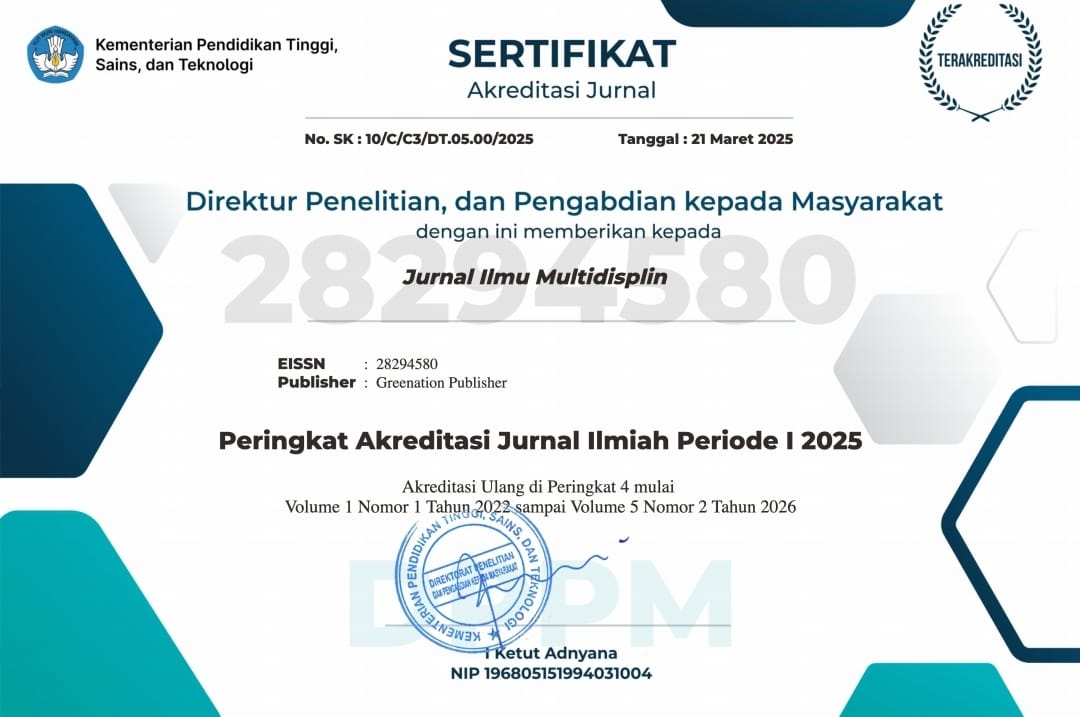Pengaruh Kompensasi dan Kompetensi dengan Motivasi sebagai Variabel Intervening terhadap Kepuasan Kerja Pegawai di Kantor Kecamatan Baturaja Timur
DOI:
https://doi.org/10.38035/jim.v4i1.876Keywords:
kompensasi, kompetensi, motivasi, kepuasan kerja, mediasiAbstract
Penelitian ini bertujuan untuk menganalisis pengaruh kompensasi dan kompetensi terhadap kepuasan kerja pegawai dengan motivasi sebagai variabel intervening di Kantor Kecamatan Baturaja Timur. Metode penelitian yang digunakan adalah kuantitatif dengan teknik pengumpulan data melalui kuesioner terhadap 40 responden. Analisis data dilakukan menggunakan regresi berganda dan uji mediasi menggunakan uji Sobel. Hasil penelitian menunjukkan bahwa kompensasi dan kompetensi berpengaruh positif dan signifikan terhadap motivasi. Selain itu, kompensasi, kompetensi, dan motivasi berpengaruh positif terhadap kepuasan kerja. Motivasi juga terbukti memediasi secara signifikan hubungan antara kompensasi dan kompetensi dengan kepuasan kerja. Temuan ini mengindikasikan bahwa peningkatan kompensasi dan kompetensi tidak hanya berdampak langsung terhadap kepuasan kerja, tetapi juga melalui peningkatan motivasi pegawai.
References
Afandi. (2018). Manajemen Sumber Daya Manusia (Teori, Konsep dan Indikator). Nusa Media. Yogyakarta
Anggaini, W., Respati, H., & Triatmanto, B. (2024), The Influence of Competence and Training towards Employee Performance through Job Satisfaction as Intervening Variable in Wonoayu Health Center, Sidoarjo Regency, International Journal of Multidisciplinary Research and Analysis, Vol. 7 Issue 9
Chandra, R., Megayani, Handoko, S., Syamsuar, G & Yulinar, (2023), Effects Of Stress And Compensation On Satisfaction And Work Motivation Of Goride Drivers, International Journal of Multidisciplinary Research and Literature., Vol. 2, No. 4, https://doi.org/10.53067/ijomral.v2i4
Choiriyah, S. & Riyanto, S., (2021). Effect of Training and Competence on Job Satisfaction and Its Impact on Employee Commitment (Case Study at BPJS Ketenagakerjaan). International Journal of Innovative Research in Science Engineering and Technology. 6. 1021-1030..
Dharmiarto, R.I., Iqbal, M.A., & Saluy, A.B., (2021), The Effect Of Leadership And Compensation On The Job Satisfaction Mediated By Motivation At Pt. Indesso Culinaroma International, Dinasti International Journal of Management Science 3(1):161-176
Grace, R. & Supartha, Wayan Gede. (2023). The Effect Of Training And Competence On Employee Job Satisfaction With Motivation As A Mediator: A Study On Regional Office Of The Badan Pertanahan Nasional Yogyakarta Special Region. Russian Journal of Agricultural and Socio-Economic Sciences. 139. 114-121. 10.18551/rjoas.2023-07.12..
Hasibuan, M. S. . (2018). Manajemen Sumber Daya Manusia. Jakarta: PT Bumi. Aksara
Janovac, T., Virijevi? Jovanovi?, S., Tadi? J., et al. (2021). The Influence Of Employee Motivation Factors On Job Satisfaction In Mining Companies. Polish Journal of Management Studies, 23(1), 224-238. https://doi.org/10.17512/pjms.2021.23.1.14.
Mundingsari, K.M., Sularso, R.A., & Susanto, A.B., (2019), The effect of training and competence on the performance of laboratory assistant through job satisfaction as intervening variable, International Journal of Scientific and Technology Research, Volume 8, Issue 10
Putra & Suwadana, (2024), The Effect Of Work Stress On Job Satisfaction With Work Motivation As A Mediating Variable, Journal of Indonesian Impressions (JII),Vol. 3, No. 1, January 2024p-ISSN:2828-1284 e-ISSN: 2810-062x
Ramadhanti, S., Hidayat, N., & Prayer, D., (2022), Effect Of Compensation And Work Environment Towards Job Satisfaction In Mediation By Work Motivation, Journal of Economic Education, Office d a n Aku n tan s i s, 7(2), 1 0 1-111.
Renaldi, Y., Handoko, B., & Ardiani, W., (2024), The Effect Of Compensation, Work Environment And Company Organizational Culture On Employee Job Satisfaction At Halim Fertility Center Medan, Jurnal Pembelajaran dan Pengembangan Diri, Volume 4 Nomor 6.
Robbins, S. P., & Judge, T. A. (2017). Organizational Behavior, Seventeenth Edition, Global Edition. In Pearson Education Limited (17th Editi). Pearson Education Limited
Salsabilla, A., Margono Setiawan, & Jiwa Juwita, H. A. (2022). The effect of workload and job stress on job satisfaction mediated by work motivation. International Journal of Research in Business and Social Science (2147- 4478), 11(9), 97–106. https://doi.org/10.20525/ijrbs.v11i9.2209
Shofiyah, S., & Dini, Y.I.F., (2023), Mediation Role of Motivation on Job Satisfaction of Batam Manufacturing Industry’s Employee, International Journal of Economics Development Research, Volume 4(6)
Simamora. (2017). Manajemen Sumber Daya Manusia. Jakarta: Gramedia
Sinambela. S., (2018). Manajemen Kinerja Pengelolaan, Pengukuran, dan. Implikasi Kinerja. Depok: PT Rajagrafindo Persada
Spencer, L. & Spencer, S.M., (1993). Competence at Work, Models For Superior Performance. Canada : John Wiley & Sons, Inc
Sutrisno, (2019). Manajemen Sumber Daya Manusia. Cetak ke sebelas. Prananda Media Group, Jakarta
Wibowo, (2017). Manajemen Sumber Daya Manusia Edisi Revisi. Surabaya: CV. R.A.De.Rozarie
Zaidi, S.A., Rehman, S.U., & Ashiq, M, (2021), Workplace Motivation and Stress on Job Satisfaction of Librarians Working in Public Sector Universities of Lahore, Pakistan, International Journal of Information Science and Management, olume 19, Issue 2, Pages 181-195
Zhang, Y., (2023), Disclosing the relationship between public service motivation and job satisfaction in the Chinese public sector: A moderated mediation model. Front. Psychol. 14:1073370. doi: 10.3389/fpsyg.2023.1073370.
Downloads
Published
How to Cite
Issue
Section
License
Copyright (c) 2025 Yovi Rinaldo, Rini Efrianti, Mardiah Kenamon

This work is licensed under a Creative Commons Attribution 4.0 International License.
You are free to:
- Share— copy and redistribute the material in any medium or format
- Adapt— remix, transform, and build upon the material for any purpose, even commercially.
The licensor cannot revoke these freedoms as long as you follow the license terms.
Under the following terms:
- Attribution— You must give appropriate credit, provide a link to the license, and indicate if changes were made. You may do so in any reasonable manner, but not in any way that suggests the licensor endorses you or your use.
- No additional restrictions— You may not apply legal terms or technological measures that legally restrict others from doing anything the license permits.
Notices:
- You do not have to comply with the license for elements of the material in the public domain or where your use is permitted by an applicable exception or limitation.
- No warranties are given. The license may not give you all of the permissions necessary for your intended use. For example, other rights such as publicity, privacy, or moral rightsmay limit how you use the material.



























